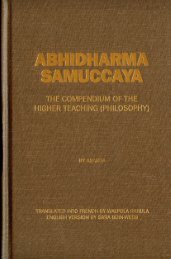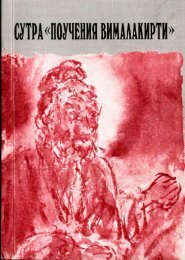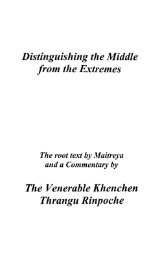ABHISAMAYALAMKARA
ABHISAMAYALAMKARA
ABHISAMAYALAMKARA
You also want an ePaper? Increase the reach of your titles
YUMPU automatically turns print PDFs into web optimized ePapers that Google loves.
322 ANALYSIS OF<br />
Accordingly, (the contents of the Sutras) contains an<br />
exposition of the aspects and the other (topics) just<br />
mentioned.<br />
Thereupon, the person who has brought to development<br />
the (cognition peculiar to the) degrees conducive to<br />
Salvation and is full of energy—<br />
7. by means of the cognition peculiar to the<br />
( 4) degrje.es conducive to Ijluminat<br />
i o n,—<br />
8. secures the properties of (a member of) the<br />
Congregation of the Bodhisattvas<br />
who in their course of training have<br />
attained the Irretrievable State.<br />
9. And, having meditated on the Ultimate<br />
Identity of Samsara and NirvSiia in<br />
order to attain Buddhahood,—<br />
10. the Bodhisattva brings to accomplishment the<br />
purification of his world of future<br />
activity as a Buddha, and—<br />
11. Owing to his skill makes manifest the<br />
activity of a Buddha 1 without effort and in correspondence<br />
with the merits and needs (of the converts^). (The contents<br />
of the Sutras accordingly represent) an exposition<br />
of the D'egrees conducive to Illumination etc. 2<br />
So we have the process of intuition of all the aspects<br />
(of the three forms of Omniscience) as peculiar to the<br />
Buddhas etc. according to the circumstances. It is spoken<br />
of (in the Astasdhasrilia}, beginning with the passage of<br />
the Fii i n t h C h a p t e r 3 :—Having been thus addressed<br />
the reverend Subhuti said to the Lord as follows :—The<br />
Climax of Wisdom is (the cognition of) the non-existence<br />
(of i the Phenomenal objects as permanent enduring<br />
entities),—-and ending with the passage of the<br />
twentieth Chapter 4 :—In the same manner the<br />
1 Compare Uttaratantra-vyakhya, Transl. p. 117.<br />
2 The first part of the fourth Adhikara, beginning with the 173<br />
akaras and ending with the 16 svabhava-laksana (Kar. IV. 1-31.^contains<br />
the general topics connected with the Path. Beginning with the<br />
(preliminary) degrees conducive to Salvation (moiisa-bhagiya) the<br />
fourth chapter contains an exposition of the actual process of realization<br />
on the Path. Rnam-bsad, 199 b. 2.—rnam-rdzogs-sbyor-ba spyihi<br />
rnam-bzag dan. thar-pa cha-mthun-nas bzun ste rgyud-la s\ye-bah.i«<br />
rim-pa bsad-paho.<br />
3 Ast 204. 20—205. 1.<br />
4 Ibid. 380. 13.<br />
THE <strong>ABHISAMAYALAMKARA</strong> 323<br />
Bodhisattvas, the Mahasattvas cannot fall a prey to the<br />
world including the gods, the human beings, and the<br />
Asuras.—<br />
[Abhis. aloka. MS. 19b. 4-20a. 3.] 1<br />
DETAILED ANALYSIS OF THE ELEMENTS CONSTITUTING<br />
THE PROCESS OF CONTEMPLATION AND INTUITION OF ALL THE<br />
ASPECTS (OF THE THREE FORMS OF OMNISCIENCE).<br />
I. The Aspects (of the three Forms<br />
of Omniscience) WI^HJ: =<br />
mam-pa.<br />
Kar. IV, 1-5 (31)<br />
I General definition ace. to Don. 2 The various meanings of<br />
akjara ace. to Skjabs. 3 General character of the aspects ace. to the<br />
Abhis. alo^a.<br />
Definition: The varieties or the special modes<br />
of apprehension peculiar to the meditative training which<br />
consists in the contemplation of the three forms of<br />
Omniscience, grasped together.<br />
[Don. 13b. 4-5.] rnkhyen-gsum bsdus-$gom~gyi sbyorbahi<br />
hdzin-stafis-kyi bye-brag-gam }^hyad-par de. mkhyen<br />
gsum bsdus-sgom-gyi shyor-b®hi rnam-pahi mtshan-nid.<br />
The word akara can be interpreted in many different<br />
ways. We may take it to nxean 1 the objective<br />
aspects of contemplation, 173 in number,<br />
refering to* the characteristic features of the (5) groups of<br />
1 For the Tib. version, ef. Appendix.



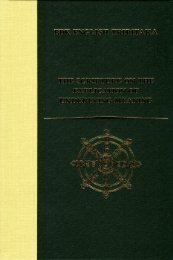
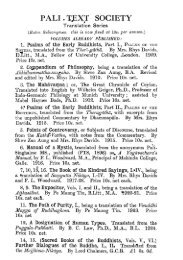


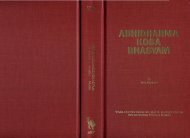



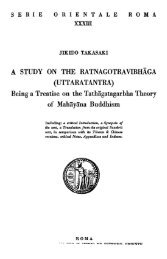
![Long Discourses of the Buddha [Digha Nikaya]](https://img.yumpu.com/32792419/1/164x260/long-discourses-of-the-buddha-digha-nikaya.jpg?quality=85)
